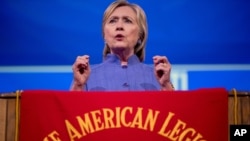U.S. presidential candidates Donald Trump and Hillary Clinton both delivered speeches this week to crowds full of military veterans, with both emphasizing issues important to veterans but using strikingly different tones.
Trump, who spoke Thursday at the American Legion national convention in Cincinnati, Ohio, focused primarily on his plans to rebuild America’s military and fix systemic problems at the ailing Department of Veterans Affairs.
While he went after Clinton twice – for her plan to increase the number of Syrian refugees entering the U.S. by 550 percent and, in passing, for her use of a private email server as secretary of state – his speech largely centered on policy ideas.
Trump called for a "total reform" of the VA and laid out a 10-point plan to fix the agency. It included appointing a new secretary, firing employees who fail to live up to his standards, ensuring veterans receive timely access to health care and creating a commission to search out wrongdoing within the agency.
"We will rebuild our depleted military and pursue a state-of-the-art missile defense. We will do it based on those three famous words: Peace through strength," Trump said. “We will make sure our soldiers, sailors, airmen and Marines have the best equipment, training and tools in the world – and we will ensure that they have the best medical care in the world, both in service and when they return home as civilians."
Clinton outlines plans
Clinton spoke at the same venue a day earlier, frequently attacking Trump – though she mentioned him by name only once – for his stance on illegal immigration and for previously calling the American military "a disaster."
"I completely reject anyone, including my opponent, who calls the American military, and I quote, ‘a disaster,'" she said. "That is an insult to the men and women serving today and all who have served before who put their lives on the line."
Clinton went on to outline her ideas of "American exceptionalism" and her vision of a strong, effective American military – even going as far as to suggest the use of military force against Russia for its alleged involvement in the July hacking of the Democratic National Committee.
“Russia’s hacked into a lot of things. China’s hacked into a lot of things. Russia even hacked into the Democratic National Committee, maybe even some state election systems … As president, I will make it clear, that the United States will treat cyber-attacks just like any other attack. We will be ready with serious political, economic and military responses,” she said.
In late July, the website WikiLeaks published a collection of nearly 20,000 emails obtained from the DNC. Wikileaks did not reveal its source, though a hacker who goes by the name of Guccifer 2.0 claimed responsibility for the attack.
Members of the Democratic Party and of the U.S. intelligence community have repeatedly accused Russian intelligence services as being behind the hack, but the Russian government has denied any involvement. WikiLeaks founder Julian Assange has said there is no proof of Russian involvement.
Projecting strength
Clinton’s vision of an American military that projects strength across the world contrasts starkly with that of Trump, who spoke of advancing "Americanism, not globalism" and of his plans to secure America’s southern border with Mexico, which has become a cornerstone of his campaign.
"Above all, these next four years, I will be uncompromising in the defense of the United States and our friends and allies," he said. "We are going to end the era of nation-building and create a new foreign policy – joined by our partners in the Middle East – that is focused on destroying ISIS and radical Islamic terrorism."
While Trump spoke of an isolated America, Clinton spoke of an America that has a global responsibility to be the standard bearer of justice and strength. She said Trump was too ill-informed to lead America’s military and called him "dangerous" for his past insinuations that, under his leadership, America might walk away from its commitment to NATO and other global alliances.
"It’s not just that we have the greatest military or that our economy is larger than any on Earth. It’s also the strength of our values, the strength of the American people," she said. "And part of what makes America an exceptional nation, is that we are also an indispensable nation. In fact, we are the indispensable nation. People all over the world look to us and follow our lead."





